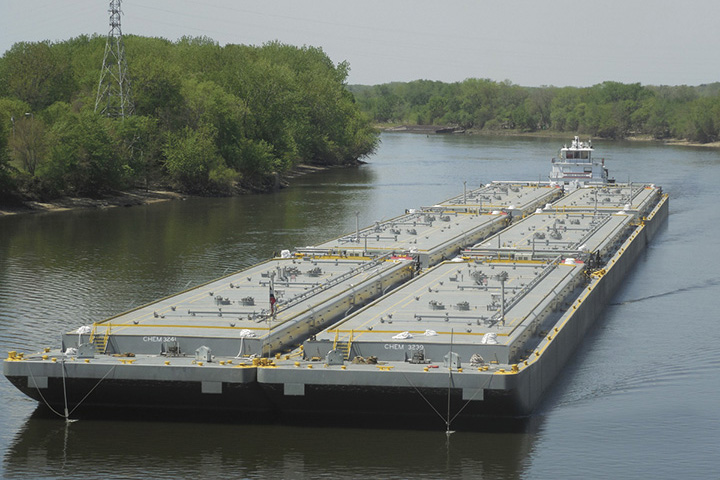The inland barge industry’s response to the coronavirus pandemic continues to evolve, with the American Waterways Operators posting protocols this week for dealing with a sick crewmember, and cleaning and disinfecting a vessel after an ill mariner disembarks.
The sample protocols are the result of collaboration among AWO-member barge companies and further refinement by AWO’s Safety Leadership Advisory Panel, Brian Bailey, AWO's director of safety and environmental stewardship, said in an email. “AWO has shared these documents with the Coast Guard and is asking that they be highlighted as industry best practices to facilitate a consistent approach to these important issues by industry and Coast Guard field units,” Bailey wrote.
Both protocols are designed to be used in conjunction.
Disembarkation guidelines for reporting crewmembers with symptoms consistent with the coronavirus include the following:
- the vessel’s master, working with shoreside management, is responsible for implementing protocols.
- In event of illness, a crewmember will be screened remotely by a company-provided medical contact. If symptoms are consistent with the virus, but the mariner’s condition isn’t an emergency, the person will be isolated in a single-occupancy sleeping quarters, and management and the Coast Guard will be contacted. Arrangements will be made to transport the sick individual by crew van or other company-provided transportation to a medical service or testing place.
- If the situation is deemed an emergency, the master will call an ambulance, contact the vessel’s office, and in coordination with the office notify the Coast Guard.
- Once the crewmember has left the vessel, decontamination protocols will begin.
- No crewmember shall to permitted onboard until a negative Covid-19 test result, successful quarantine or complete off boarding and decontamination has been completed.
- If the suspected crewmember tests positive, the rest of the crew shall remain quarantined aboard the vessel while continuing to implement operational protocols for a time recommended by the company’s medical professional and approved by the Coast Guard. At the end of this period, if no mariners have fallen ill or shown symptoms, the vessel shall return to normal operations without restrictions.
- If the test result is negative, the rest of the crew shall be released from quarantine and the vessel returns to normal operations.
- If the master, mate/pilot, engineers or more than one deck crewmember falls ill and has been removed. the vessel shall stop at the closest fleet or safe anchoring location to await test results. A positive would mean quarantine for the crew on the vessel for a time period decided by the company and the Coast Guard. If a negative result, a relief crew shall board and the vessel returns to normal operations.
- The company may decide to completely off-board the crew, decontaminate the vessel and onboard an entirely new crew, subject to Coast Guard approval.
Decontamination protocols after an ill crewmember has left the vessel include the following:
- The vessel master is responsible for implementing and ensuring compliance of procedures.
- If weather and operating conditions permit, nearby windows and doors should be opened.
- On continuous occupancy vessels, the infected crewmember’s sleeping quarters should be put off-limits for 24 hours after disembarkation, then cleaning procedures of the room can be followed while cleaning of the rest of the vessel should begin immediately. On fleet boats and smaller vessels, cleaning and disinfection on all areas should start immediately because it may not be possible to stay out of the area where the symptomatic crewmember was located.
- Disinfecting should be done using EPA-approved products and should include all touchable surfaces, tables, chairs, knobs, light switches. There are other procedures for bedding, carpeting, drapery and clothing.
AWO's Bailey said that many barge lines have made plans with lodging establishments such as local hotels to house their quarantined crews so that the vessel can be disinfected, and a relief crew brought in to resume the vessel’s itinerary.
“Crews should not be placed in unnecessary situations where there exists potential to transmit Covid-19 to others, including non-exposed colleagues, their families and the public,” he said.
As of Wednesday, the AWO has not been made aware of any positive Covid-19 diagnoses on member company towing vessels, Bailey said.




